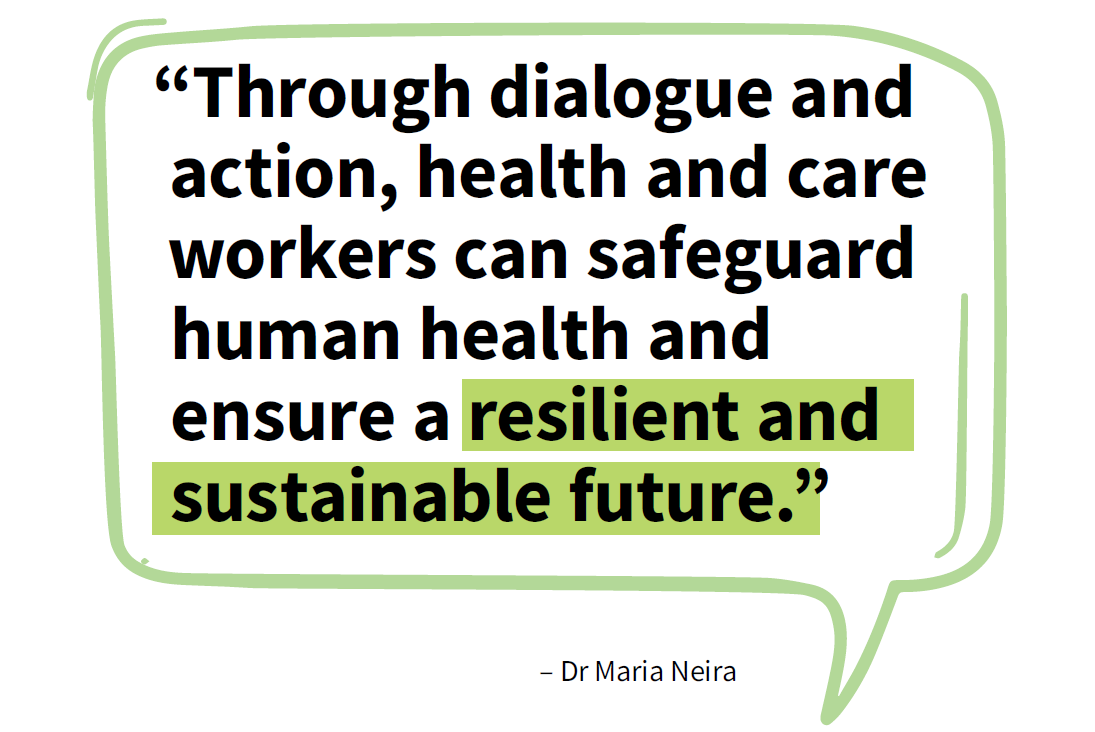Greta H from Climate and health news has recently published this informative blog which looks at the New toolkit for health professionals from the World Health Organization.
Communicating climate change and health
Image used under Creative Commons licence: CC BY-NC-SA 3.0 IGO .
The World Health Organization (WHO) recently launched Communicating on climate change and health: toolkit for health professionals.
Why is it important for health and care workers to talk about climate change?
Dr Maria Neira, Director of the Department of Environment, Climate Change and Health at WHO spoke at the launch of the toolkit, calling health professionals to action.
Neira made the case that climate change is one of the most important topics in public health today. The voice of health professionals, she argued, is one of the most trusted and that comes with a responsibility to raise awareness and take part in advocacy.
Neira said, “For those who are still hesitating, let me tell you, don’t allow anyone to tell you that this is not your business. [...] Don’t renounce this influential role and the trust that you represent.”
Thank you for reading Climate and health news. This post is public so feel free to share it.
Remy Shergill, from Australia’s Climate and Health Alliance, introduced the toolkit. She began with a series of quotes, highlighting that climate change is the biggest global health threat of the 21st century, and that tackling climate change is the greatest health opportunity of the century. Taking climate action has the potential to relieve some of the burdens from our health systems. But, in spite of all the evidence, there is a gap in awareness gap and action.
Shergill said that health professionals often express concern about talking about about climate change because they are not climate scientists. However, they have the authority to discuss public health threats and climate change is a clear and serious public health threat. She said health is a persuasive way to talk about climate change and the evidence base supports the unique role of health professionals in building support for climate solutions.
What is (and isn’t) in the toolkit?
The toolkit isn’t a review of evidence on climate change, health or communication theories (although it is partly based on a literature review). It is designed to be quickly skimmed, with succinct tips and tools. Given the need for the recommendations to be applicable in many different settings, it does not go into detail about specific impacts or actions.
There is a brief summary of the health effects of climate change, but the focus is on the opportunity of climate action to improve health and wellbeing.
How to talk about climate change
To get started, the first step is to think about your audience and your goal. Are you talking to a colleague, a policymaker, a journalist, a patient or a friend? Is your goal to convince or persuade a policymaker, provide a quote for a journalist or provide empowering or supportive information for someone in your care? Getting clear about your audience and goal will help you to decide what to say and how to say it.
The toolkit authors give examples of some easy ways to start – sharing information at work, such as a poster in your waiting room or something on your website, connecting with other people locally who are doing this work, or practising what you want to say with someone you trust.
Ten top tips
The toolkit gives ten top tips of climate-health communication, based on the available evidence.
1. Keep your message simple and repeat it often
2. Focus on human health
3. Understand your local context
4. Don’t use jargon
5. Empower people to make good decisions about their health
6. Talk about the health benefits of climate action
7. Tell stories to connect with people
8. Avoid polarising language
9. Talk about climate change during extreme weather events
10. Don’t debate the science.
In addition to the tips, the toolkit includes some case studies and sample messages, a section on effective storytelling and some common communications challenges and how to avoid them.
Finally, the authors say – practice makes perfect. Making a start is important and your confidence as a climate-health communicator will grow.
Reference
Communicating on climate change and health: toolkit for health professionals. Geneva, World Health Organization, 2024.
You can download the toolkit, read a press release about it and watch a recording of the launch event on the WHO website.

Thanks for sharing - looks useful, especially as I'm looking to present the Carbon Literacy course.
Please log in or sign up to comment.